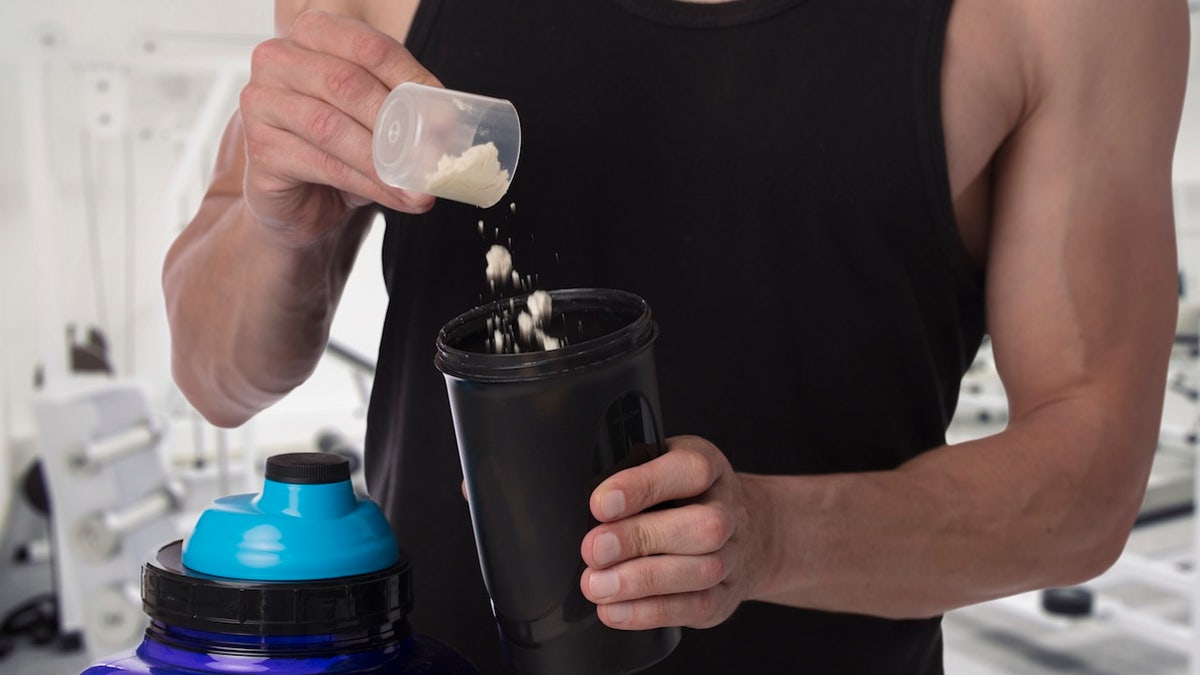Popular sports supplement shown ineffective in study
Creatine is a popular supplement used to help build muscle, but researchers in Australia are questioning its effectiveness.
Investigators from the University of New South Wales (UNSW) in Sydney found that individuals who took creatine while performing a three-month weightlifting regimen put on the same amount of muscle as those who did not take the supplement while lifting.
That’s according to their recent study, which was published in the journal Nutrients.
COMMON SUPPLEMENT COULD HELP YOU LIVE LONGER, RESEARCH SUGGESTS
“We’ve shown that taking 5 grams of creatine supplement per day does not make any difference to the amount of lean muscle mass people put on while resistance training,” senior author Dr. Mandy Hagstrom, PhD, an exercise scientist from UNSW’s School of Health Sciences, said in a news release about the study.

Creatine is a popular supplement used to help build muscle, but researchers in Australia are questioning its effectiveness. (iStock)
The clinical trial looked at 54 relatively healthy participants ranging from 18 to 50 years old who were divided into two groups.
Both groups completed the same 12-week resistance training, comprised of three supervised workouts a week.
COMMON VITAMIN SHOWN TO REDUCE AUTOIMMUNE DISEASE
The creatine group took the supplement one week prior to beginning the training regimen, referred to as a “wash-in,” and continued taking the 5-gram dose each day for a total of 13 weeks while performing the exercise routine. The control group received no creatine or placebo during the workout period.
“This is the first creatine study to utilize a wash-in phase, which is standard in other clinical trial designs,” Hagstrom told Fox News Digital.

Investigators found that individuals who took creatine while performing a three-month weightlifting regimen put on the same amount of muscle as those who did not take the supplement while lifting. (iStock)
“This allows the effect of the creatine supplement to be separated from the effect of resistance training.”
Previous trials have started supplementation and exercise programs on the same day, she noted, which made it difficult to determine the impact of each.
The researchers looked at lean muscle body mass in both groups at baseline, then after the seven-day wash-in and after completion of the 12-week weight-lifting program.
“Taking 5 grams of creatine supplement per day does not make any difference to the amount of lean muscle mass people put on while resistance training.”
They used “dual-energy X-ray absorptiometry” — which is a non-invasive imaging technique — to measure bone mineral density and body composition.
While the creatine-supplemented group (particularly the women) showed about a one-pound gain in lean body mass compared to the non-supplemented group at the seven-day mark, both groups showed a 4.4-pound gain after performing the 12-week resistance training program.
There was no difference between the two groups when it came to lean body mass growth, according to the study.

“Our research found that creatine supplements are not effective for building lean body mass with strength training when taken at the recommended maintenance dose, but there are many other benefits of creatine that were not assessed in our study,” a researcher told Fox News Digital. (iStock)
“The people taking the creatine supplement saw changes before they even started exercising, which leads us to believe that it wasn’t actual real muscle growth, but potentially fluid retention,” Hagstrom said.
Once the participants started exercising, they saw no additional benefit from creatine, she said — “which suggests that 5 grams per day is not enough if you’re taking it for the purposes of building muscle.”
STRICT FASTING DIET HELPED GOLFER PHIL MICKELSON LOSE 25 POUNDS
The participants did not do a typical creatine-loading phase, which involves taking 20 to 25 grams a day for up to a week to try to saturate the muscles’ creatine stores, the study authors stated in the news release.
While it is common to start with a loading phase dose, it can cause gastrointestinal issues, they noted.
More research needed, authors say
Hagstrom’s team said more research is needed to determine whether a higher dose, such as 10 mg, is needed to achieve the desired lean body mass growth effect. (This higher dose has shown benefits for bone and brain health.)
“Our research found that creatine supplements are not effective for building lean body mass with strength training when taken at the recommended maintenance dose, but there are many other benefits of creatine that were not assessed in our study,” Hagstrom told Fox News Digital.

The creatine group took the supplement one week prior to beginning the training regimen and continued taking the 5-gram dose each day for a total of 13 weeks while performing the exercise routine. (iStock)
Another area of interest for future studies is whether creatine may have a long-term benefit, according to Dr. Imtiaz Desai, one of the study authors.
“When you start weight training, you have those beginner gains in strength, which start tapering off around the 12-week mark and become slower, so it’s possible the support from creatine might come at a later stage,” Desai said in the news release.
‘Food-first’ approach
Makenzi Mollitor, a registered sports dietitian at TSI: The Schwarz Institute in Massapequa, New York, commented on the study to Fox News Digital.
She said she prefers a “food-first” approach when it comes to taking supplements.
CLICK HERE TO GET THE FOX NEWS APP
“Putting on muscle takes a combination of nutrition and resistance training,” Mollitor, who was not involved in the study, told Fox News Digital.
Those looking to build muscle should prioritize nutrition around their resistance training schedule, she advised.
CLICK HERE TO SIGN UP FOR OUR HEALTH NEWSLETTER
“Eating a combination of protein and carbohydrates almost immediately after training — ideally within the hour — will help to promote muscle growth and repair,” Mollitor, who works with Division 1 athletes at Long Island University in New York, told Fox News Digital.
“By prioritizing protein, you will also be consuming creatine, because creatine is naturally found in protein sources such as meat, poultry and fish,” she added.
“If you are someone who doesn’t eat a lot of animal protein or is vegan/vegetarian, a supplement could help fill those gaps.”
Supplements do have their place, however, according to the expert.
“If you are someone who doesn’t eat a lot of animal protein or is vegan/vegetarian, a supplement could come in handy to help fill those gaps,” she said.
For more Health articles, visit www.foxnews.com/health
For those who choose to supplement with creatine, Mollitor recommends consuming a dose of creatine either immediately before or after training.
To ensure the safety and purity of ingredients, she also emphasized the importance of choosing a supplement that has been tested by a third party.





